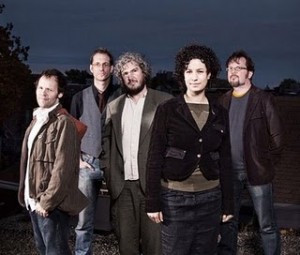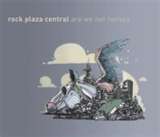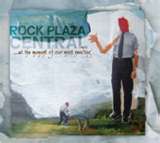A fortuitous meeting at an Ivy League radio station partnered schoolmates Ben Knox Miller and Jeff Prystowsky in a worthy musical venture that has provided some great dividends along the way. Uniting in 2002 as Brown University on-air staffers at WBRU, the dynamic multi-instrumental duo became interested in learning everything they possibly could about compositional construction, studio production, proper miking, and other technical aspects from the outset.
Four years down the road, the humble Rhode Island twosome would hit the road as The Low Anthem, finding a national audience with their sympathetic travelogues, rustic road odes, and hexed lover’s concertos. In 2007, Jocie Adams came aboard full time and the skillful troika received great underground exposure with the convincing What The Crow Brings.
By this point, The Low Anthem had secured their status as one of the best Americana-related acts, comparing favorably against en vogue folkies such as North Carolina’s Avett Brothers and New York’s Felice Brothers. A more direct contemporary comparison with Seattle’s baroque rock-oriented Fleet Foxes is fair, but the dramatic pathos wafting through the drifting rural pastures this alluring Rhode Island troupe sojourn cuts deeper and goes further on ‘09s magnificent Oh My God, Charlie Darwin.
 An ambitious achievement reliant on plaintive Country folk restraint and countered perfectly by feverish roadhouse Blues, Oh My God takes place in the 19th century when English naturalist Charles Darwin’s scientific theories on the transmutation of species were being developed. And despite Miller’s pragmatic lyrical perspective, his solemn requiems cannot escape dipping into spirited religiosity.
An ambitious achievement reliant on plaintive Country folk restraint and countered perfectly by feverish roadhouse Blues, Oh My God takes place in the 19th century when English naturalist Charles Darwin’s scientific theories on the transmutation of species were being developed. And despite Miller’s pragmatic lyrical perspective, his solemn requiems cannot escape dipping into spirited religiosity.
“The interest in Darwin is less with his historical figure and more with the way he challenged the idea of survival of the fittest. Especially when you look at morality and the teachings of Christianity,” Miller asserts during a phone call from a secluded Oklahoma village on route to Texas. “It’s a record about how our ideas and values are subjected to survival of the fittest. I’m not anti-religious, but the album recognizes the church has a missionary arm and the church is spreading itself and its ideas like an animal reproduces and the genes are passed on. There’s the reference that Darwin’s acknowledged that sort of analogy – looking for something to hold on to as far as values or identity.”
Miller’s parents were highly influential music informants. As a pre-teen, basic roots rock and acoustic folk artists topped the list of formative compositional inspirations.
“The stuff I heard as a kid were Bob Dylan, Woody Guthrie, and Pete Seeger. That’s what I heard at home,” he advises. “Certainly, I found the Beatles and Rolling Stones, but Pete Seeger was always on whether at school or wherever. I learned his songs at a young age.”
Projecting gloom, agony, and longing with his strikingly melancholic fragile tenor and nasally droned baritone whine, Miller’s trembled quiver stirringly haunts stripped-down meditational ruminations such as the whispered opening dirge, “Charlie Darwin,” and desolate Cathedral-bound Cowboy Junkies-like threnody, “Cage The Songbird.”
“Those are arrangements we came up with at the end of the process,” Miller informs. “We tried them different ways, changing the tempo, instrumentation, and who’s playing what instrument. That happened right at the end of the studio session. We said, ‘OK. Let’s do them an octave higher.’ There’s this choral quality where we all sing the harmonies together. It’s just a small fraction of what we do, but it’s an important part of our sound. I’m not sure whose idea it was but it came at the end of a long process of figuring out how to (make the songs gel).”
An air of desperation also bedevils poignant muzzle-voiced maunder “Ticket Taker.” Similarly, the barren atmospherics of comforting campfire command, “(Don’t) Tremble,” and mystical yearn, “To Ohio,” recall Nick Drake’s ghostly empyreal ‘70s recordings. Forlorn train-whistle harmonica, pump organ, banjo, clarinet, and saxophone help increase the magnitude of Miller’s solitary grief-stricken hymnals.
“Charles Darwin has a better live feel. What The Crow Brings was self-produced and engineered. Jeff and I did it as a duo and everything was overdubbed. We were learning to do basic production. It was a modest production,” Miller admits. “Because it was just the two of us, we spent a lot of time adjusting microphones and recording each other. Besides the first two tracks we laid down, there wasn’t much of a live feeling to the record. There weren’t as many hands on deck so we couldn’t experiment with these wild arrangements. You had to go one step at a time to see how the combination of things sounded. But when there were three of us (with the addition of Adams), you could try different things.”
 Interestingly, the Low Anthem’s ethereal moniker could be seen as a teasingly sly referral to Minneapolis slo-core enchanters, Low, and the hushed anthemic lamentations thereof.
Interestingly, the Low Anthem’s ethereal moniker could be seen as a teasingly sly referral to Minneapolis slo-core enchanters, Low, and the hushed anthemic lamentations thereof.
My hypothesis has Miller laughing before he jokingly quips, “That only occurred as an afterthought.”
Then again, he’s not so dismissive of my intimations that “Ticket Taker” alludes to Simon & Garfunkle’s majestic “Bridge Over Troubled Waters” (via lyrical tidbit ‘I will be your arc to float across the storm’) or equally resplendent neo-Classical elegy “The Boxer” (as per the agonized ‘boxer felt no pain’).
“Those are all references I’m very familiar with. But there’s a lot of other songs about boxers like Dylan’s “Hurricane.” So it’s not a direct reference,” he surmises.
Thankfully, The Low Anthem never feel relegated to only delivering drowsy Country & Western-procured entreaties a la the reverent “Will The Circle Be Unbroken” knockoff, “OMGCD.” They prove just as successful reinterpreting Mississippi Delta Blues, tearing it up with the best of ‘em on whiskey-bent junkyard rumble, “Champion Angel,” an electric guitar-driven number that’d fit alongside the Black Keys, North Mississippi All Stars, and early Kings Of Leon.
“That song shows a seriously different side to the band. Why should we be restricted when we’re able to use so many vintage instruments,” Miller maintains.
Moreover, scraggly gravel-voiced omen, “The Horizon Is A Beltway,” and Beat-derived Kerouac poem, “Home I’ll Never Be,” indulge Tom Waits’ raspy beatnik scruff. Another mournful pledge, “To The Ghosts Who Write History Books,” begs for consolation while indirectly exorcising demons.
Perhaps Charlie Darwin unintentionally mirrors America’s current economic woes with its downtrodden hard-times-in-the-land-of-plenty proverbs. One good listen will convince the unsure, and probably uninsured, proletariat that we’re all mere castaways betwixt the Atlantic and Pacific shorelines. It’s sometimes comparable to the bleak caliginous sundowners underscoring two of ‘09s finest long-play indie releases – Grizzly Bear’s divine revelation Veckatimest and Animal Collective’s equally enlightened Merriweather Post Pavilion.
The main difference is The Low Anthem’s reliance on established roots-based folk (dust bowl balladeering and old timey Appalachian anecdotes included) instead of conventional pop techniques. They inventively redirect present-day narratives and pave the way for a looming apocalyptic future with a few choice acoustical renditions. Their grim, bleary-eyed accounts plead for salvation in a world full of fear and pain and disintegration.
-John Fortunato














 Admirable anti-fascist South American hippie, Sergio Dias, gained international acclaim fronting Os Mutantes, rebellious bossa nova-based folk surrealists whose ceremonial Beatles-influenced Tropicalia clashed against politically-empowered authoritarian traditionalists during Brazil’s turbulent late ‘60s uprising. The Sao Paola-raised Dias, alongside percussionist-brother, Arnaldo Baptista, and female singing counterpart, Rita Lee Jones, helped devise an enduring musical style rooted in their country’s cultural heritage and inspired by contemporary absurdist pop.
Admirable anti-fascist South American hippie, Sergio Dias, gained international acclaim fronting Os Mutantes, rebellious bossa nova-based folk surrealists whose ceremonial Beatles-influenced Tropicalia clashed against politically-empowered authoritarian traditionalists during Brazil’s turbulent late ‘60s uprising. The Sao Paola-raised Dias, alongside percussionist-brother, Arnaldo Baptista, and female singing counterpart, Rita Lee Jones, helped devise an enduring musical style rooted in their country’s cultural heritage and inspired by contemporary absurdist pop. Reintroduced via David Byrne’s culturally diverse Luaka Bop label, fabulous ’99 compilation, Everything Is Possible!, definitively captures the distended trio in all its early resplendence. Cryptic bedevilment, “Ave, Lucifer,” and phase-shifting sub-aquatic fugue, “Dia 36,” defy easy categorization. “Baby (1971)” finds redheaded temptress, Rita Lee, purring suggestively above Spanish guitar and cocktail lounge piano. On “Fuga No. 11,” a two-part neo-Classical orchestral, her reverberating multi-tracked coo reaches angelic heights. Elsewhere, a blistering Electric Prunes riff anchors “A Minha Menina,” an enchanting hand-clapped Trini Lopez knockoff entwined with “Peppermint Twist” shout-outs. And the entire ensemble goes percussive on electric-guitar injected escapade “Cantor De Mambo.”
Reintroduced via David Byrne’s culturally diverse Luaka Bop label, fabulous ’99 compilation, Everything Is Possible!, definitively captures the distended trio in all its early resplendence. Cryptic bedevilment, “Ave, Lucifer,” and phase-shifting sub-aquatic fugue, “Dia 36,” defy easy categorization. “Baby (1971)” finds redheaded temptress, Rita Lee, purring suggestively above Spanish guitar and cocktail lounge piano. On “Fuga No. 11,” a two-part neo-Classical orchestral, her reverberating multi-tracked coo reaches angelic heights. Elsewhere, a blistering Electric Prunes riff anchors “A Minha Menina,” an enchanting hand-clapped Trini Lopez knockoff entwined with “Peppermint Twist” shout-outs. And the entire ensemble goes percussive on electric-guitar injected escapade “Cantor De Mambo.” Listening to Haih, it’s easy to relish these morphed mutants unexpected reawakening forty years beyond their Sixties commencement. Commanding cinematic opener, “Querida Querida,” offers fiery rock-driven six-string combustion and a busy cymbal/ hi-hat groove to juxtapose the silent-loud acoustic-electric exchanges permeating musty catacomb, “Teclar.”
Listening to Haih, it’s easy to relish these morphed mutants unexpected reawakening forty years beyond their Sixties commencement. Commanding cinematic opener, “Querida Querida,” offers fiery rock-driven six-string combustion and a busy cymbal/ hi-hat groove to juxtapose the silent-loud acoustic-electric exchanges permeating musty catacomb, “Teclar.” Rocking all over America since age seventeen, contentious bad-ass punk diva, Jemina Pearl, hit the ground running in the now-defunct Be Your Own Pet before hijacking their drummer to co-compose a few tunes as lead guitarist in a solo venture she only hoped would satisfy loyal minions. The oldest daughter of churchgoing Jesus-worshipping hippies whose father played in a local rock and roll band, Pearl’s cutesy snot-nosed tomboy image and volatile onstage disposition proceed her.
Rocking all over America since age seventeen, contentious bad-ass punk diva, Jemina Pearl, hit the ground running in the now-defunct Be Your Own Pet before hijacking their drummer to co-compose a few tunes as lead guitarist in a solo venture she only hoped would satisfy loyal minions. The oldest daughter of churchgoing Jesus-worshipping hippies whose father played in a local rock and roll band, Pearl’s cutesy snot-nosed tomboy image and volatile onstage disposition proceed her. Piss and vinegar run through Pearl’s coarse veins on pissy fuck-offs such as “Undesirable” and loose-y goosey glam slam, “Selfish Heart.” Similarly, ‘black tears’ stain her pale face on the guitar-rumbled “No Good.” On the more sensitive side, innocent love trinket “Heartbeats,” melodic pop charmer “Band On The Run,” and leathery black-hearted Joan Jett-enticed decree “Looking For Trouble” manage to ‘cut a little deeper.’ Meanwhile, “Ecstatic Appeal” could easily pass for a coquettish Go-Go’s new wave knockoff.
Piss and vinegar run through Pearl’s coarse veins on pissy fuck-offs such as “Undesirable” and loose-y goosey glam slam, “Selfish Heart.” Similarly, ‘black tears’ stain her pale face on the guitar-rumbled “No Good.” On the more sensitive side, innocent love trinket “Heartbeats,” melodic pop charmer “Band On The Run,” and leathery black-hearted Joan Jett-enticed decree “Looking For Trouble” manage to ‘cut a little deeper.’ Meanwhile, “Ecstatic Appeal” could easily pass for a coquettish Go-Go’s new wave knockoff. ?
? Though he’s known for spreading surrealist sociopolitical surreptitiousness in Brooklyn’s praiseworthy TV On The Radio, bespectacled wooly-bearded natty-haired singer-guitarist, Kyp Malone, strove to delve deeper, mining tearful expressions of the heart under the stormy nom de plume, Rain Machine. But it took the urging, benevolence, and planning of respected producer, Ian Brennan, to get Malone’s solo project as Rain Machine off the ground instead of staying on the backburner forever.
Though he’s known for spreading surrealist sociopolitical surreptitiousness in Brooklyn’s praiseworthy TV On The Radio, bespectacled wooly-bearded natty-haired singer-guitarist, Kyp Malone, strove to delve deeper, mining tearful expressions of the heart under the stormy nom de plume, Rain Machine. But it took the urging, benevolence, and planning of respected producer, Ian Brennan, to get Malone’s solo project as Rain Machine off the ground instead of staying on the backburner forever. Creating harrowing apocalyptic symphonies-of-the-damned, TV On The Radio first found firm footing with ‘04s evocative Desperate Youth, Blood Thirsty Babes. Its daringly prophetic doom and gloom brought about an abstruse caliginous rage fueled by murky African tribal rhythms, righteous spiritual marches, and densely hazed urban prog-funk. Majestic intoxication, “Staring At The Sun,” the glaring ritualistic threnody that put the band on the proverbial map, offered funereal post-911 prog-funk transcendence.
Creating harrowing apocalyptic symphonies-of-the-damned, TV On The Radio first found firm footing with ‘04s evocative Desperate Youth, Blood Thirsty Babes. Its daringly prophetic doom and gloom brought about an abstruse caliginous rage fueled by murky African tribal rhythms, righteous spiritual marches, and densely hazed urban prog-funk. Majestic intoxication, “Staring At The Sun,” the glaring ritualistic threnody that put the band on the proverbial map, offered funereal post-911 prog-funk transcendence.
 Though they had trouble getting off the ground and finding decent gigs, the White Rabbits worked hard at the beginning to get Fort Nightly proper indie exposure. Levinson added a great pair of hands to finish the album, helping the surging sextet strategize and conquer. As sweeping three-part harmonies abound, the guiding tambourine-shaken rhythm quickens the pulse of strolling roundabout, “The Plot” (recalling quirky ‘80s Brit-pop champions, XTC). A piano-based tango groove hexes the climactic multi-harmony swoon enriching Cabaret-darkened “Kid On My Shoulders.” And a busy Afro-beat gallop consumes the sanguine vocalizing on “I Used To Complain Now I Don’t” (where Beirut’s Jon Natchez plies ska-derived sax to an unearthly delight with an arty Talking Heads penchant).
Though they had trouble getting off the ground and finding decent gigs, the White Rabbits worked hard at the beginning to get Fort Nightly proper indie exposure. Levinson added a great pair of hands to finish the album, helping the surging sextet strategize and conquer. As sweeping three-part harmonies abound, the guiding tambourine-shaken rhythm quickens the pulse of strolling roundabout, “The Plot” (recalling quirky ‘80s Brit-pop champions, XTC). A piano-based tango groove hexes the climactic multi-harmony swoon enriching Cabaret-darkened “Kid On My Shoulders.” And a busy Afro-beat gallop consumes the sanguine vocalizing on “I Used To Complain Now I Don’t” (where Beirut’s Jon Natchez plies ska-derived sax to an unearthly delight with an arty Talking Heads penchant). Returning two years hence, the White Rabbits have gained confident, increased conviction, and fulfilled their initial promise. It’s Frightening gives percussionists Levinson and Matthew Clark a more prominent role also afforded new bassist Brian Betancourt. A thunderous Burundi tribal stomp raids the bewitchingly sumptuous mantra, “Percussion Gun” (with its blistered guitar riff and ominous piano). Heightening the tension, sweet-voiced ascensions hover above the kick-drummed tambourine-slapped rumble, “Rudie Fails.” Bastard Latino hybrid, “Company I Keep,” offers a slow and sensitive bossa nova provocation while “The Lady Vanishes” indirectly recalls Beatles knockoffs such as Badfinger and Squeeze in its own unique way. A true cornucopia of well-defined musical ideas linked to, but never forged in, the recent past, give It’s Frightening a commanding presence its still-vital predecessor, Fort Nightly, more than hinted at.
Returning two years hence, the White Rabbits have gained confident, increased conviction, and fulfilled their initial promise. It’s Frightening gives percussionists Levinson and Matthew Clark a more prominent role also afforded new bassist Brian Betancourt. A thunderous Burundi tribal stomp raids the bewitchingly sumptuous mantra, “Percussion Gun” (with its blistered guitar riff and ominous piano). Heightening the tension, sweet-voiced ascensions hover above the kick-drummed tambourine-slapped rumble, “Rudie Fails.” Bastard Latino hybrid, “Company I Keep,” offers a slow and sensitive bossa nova provocation while “The Lady Vanishes” indirectly recalls Beatles knockoffs such as Badfinger and Squeeze in its own unique way. A true cornucopia of well-defined musical ideas linked to, but never forged in, the recent past, give It’s Frightening a commanding presence its still-vital predecessor, Fort Nightly, more than hinted at.

